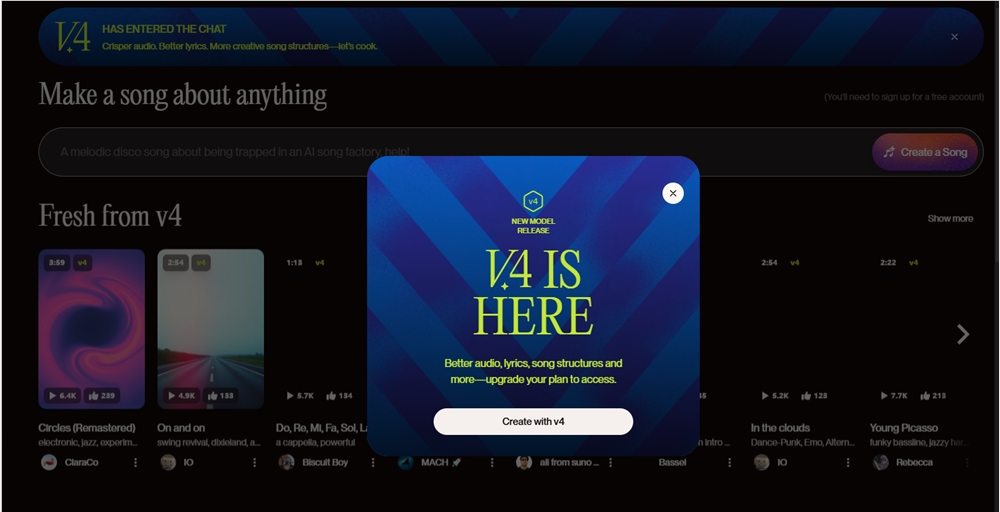AI music platform Suno continues to innovate amid copyright disputes and today officially released its fourth-generation model V4, bringing revolutionary upgrades to paying users. As the fifth largest generative AI service provider in the world, Suno has always been committed to improving the AI music creation experience, and the release of the V4 version is a concentrated expression of its technical strength. The new model has significantly improved sound quality, creative tools and functions, and actively responds to copyright challenges, striving to achieve breakthroughs in the field of AI music.
Suno, the AI music platform that continues to innovate amid copyright disputes, is undergoing a major upgrade today. As the fifth largest generative AI service provider in the world, Suno officially released the fourth generation model (V4) for paying users, bringing revolutionary technological breakthroughs and creative experience.
The most notable improvement with this new model is the overall improvement in sound quality. Not only has the quality of newly created music works been greatly improved, users can also upgrade existing works to the V4 sound quality standard, injecting new vitality into past works. In terms of creative tools, the V4 version introduces a more intelligent lyrics creation system, which can generate more creative and artistic lyric content. At the same time, the new cover design function allows creators to create a visual presentation that perfectly matches the music style.
Today's music has finally reached a level that makes people actively want to listen to it. So said Suno co-founder Mikey Shulman in a new office space near the Harvard University campus. This office area, which will soon be expanded to three floors, is equipped with a professional recording studio, various musical instruments and top-notch sound systems, demonstrating the company's strict pursuit of music quality.
The V4 version also brings two important features: the cover function allows users to explore the possibilities of different music styles, while the vocal consistency technology helps creators create unique and stable sound characteristics. By supporting more complex and diverse song structures, V4 greatly expands the possibilities for music creation.

Along with technological breakthroughs, Suno's team size is also expanding rapidly. In just a few months, the company's employees grew from 12 to more than 50. Despite facing talent competition from technology giants such as OpenAI, Shulman believes Suno has a unique advantage in aligning AI with human aesthetics.
Unlike large language models that can be quantified and evaluated, Suno's engineers mainly optimize the model by analyzing user preferences. The new version has achieved a qualitative leap in sound quality, with significant improvements in sound clarity, vocal realism, and stereo effect. In terms of composition, V4 shows greater creativity and is able to weave surprising chord changes.
The platform has also launched a number of innovative cooperation functions, allowing users to upload personal works, a cappella recordings or audio loops to achieve human-machine collaborative creation. The beta version also supports inspiring creative ideas through videos or photos. According to project manager Rebecca Hu, these new features are attracting more and more young music producers to join the platform.
However, copyright issues remain an important challenge for Suno. Although artists including famous producer Timbaland have begun to embrace this technology, the entire recording industry is still cautious about AI music. In this regard, Shulman looks forward to reaching an industry consensus on the use of training data, and also reminds the industry to pay attention to the challenges posed by AI voice imitation technology that may arise in the future.
The release of the Suno V4 version marks a new milestone in AI music creation. The editor of Downcodes believes that with continued technological innovation and active response to copyright issues, Suno will bring more possibilities to the music industry.